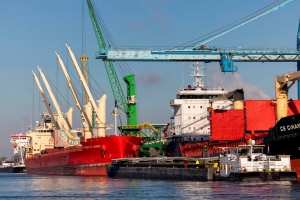


(Posted on 18/07/22)
In the first quarter of 2022, the businesses in North Sea Port recorded 37.5 million tons of seaborne freight transhipment. That is 3.5 million tons more than in the same period in 2021, an increase of 10.3%.
This increase is mainly attributable to the second quarter of 2022, which was the strongest ever recorded. It also made it the best half year ever.
The transhipment of general cargo recovered strongly during the first six months of 2022 with a growth of over 21% – up 1 million tons to a total of 5.5 million tons, thanks to more steel sheet, fruit & vegetables and wood. That puts general cargo, over the first half of the year, at about the same level as before the pandemic.
Dry bulk experienced growth of 2.4 million tons to 20.2 million tons. This 13.6% increase was seen primarily in solid fuels (mainly coal and petcoke), oilseeds, building materials and products for the steel industry.
Liquid bulk remained static at a total of 8.7 million tons.
Due mainly to reduced transhipment of fruit & vegetables by container (as opposed to general cargo), container transhipment declined by over 13% to 1.1 million tons.
Russia was the most important trading partner in 2021. With an increase of almost 20% (to 3.8 million tons), that was also the case for the first half of 2022. Certain products from Russia fell under EU embargo this year or will do so from 10 July (wood) or 10 August (solid fuels). Additional stocks of such products have been built up in recent months. However, a decline in cargo traffic with Russia is anticipated for the second half of the year.
In addition, there has also been a notable increase in trade with the United States (+15%, solid fuels), Finland (+31%, solid fuels) and Canada (+40%, iron ore and fertilisers).
Like seaborne cargo transhipment, inland navigation transhipment also recorded its best quarter and best half year ever – 33 million tons for the first six months, an increase of almost 13%.
In a ‘normal’ year, the half-year figures can be more or less doubled to arrive at the annual result. In all likelihood, this will not be true of the figures for the first six months of this year. North Sea Port expects a decline in transhipment figures due to, among other things, the start of the trade embargo on timber and solid fuels from Russia, further rising inflation, a slow decline in built-up stocks and continuing high fuel prices.
With this year’s Rail Conference “Rail Freight Transport and Seaports”, a joint initiative... Read more
Asian Bulk Logistics (ABL Group) and ICG have jointly announced the successful completion of ABL&rsquo... Read more
Abu Dhabi based AD Ports Group, a leading global enabler of integrated trade, industry and logistics... Read more
The Executive Board of Hamburger Hafen und Logistik AG (HHLA) has appointed Patrick Krawutschke as Managing... Read more
Abu Dhabi based AD Ports Group, a global enabler of integrated trade, transport, industry, and logistics... Read more
This year marks a significant milestone in maritime innovation as Port Hedland, Australia, celebrates... Read more
Associated British Ports (ABP), the UK’s leading port operator, has announced the latest tranche... Read more
During the Investment, Labour, and Trade Promotion Programme in Japan (November 16–22, 2025),... Read more
AD Ports Group subsidiary Khalifa Economic Zones Abu Dhabi - KEZAD Group, the largest operator of integrated... Read more
Abu Dhabi based AD Ports Group, a global enabler of integrated trade, transport, industry, and logistics... Read more